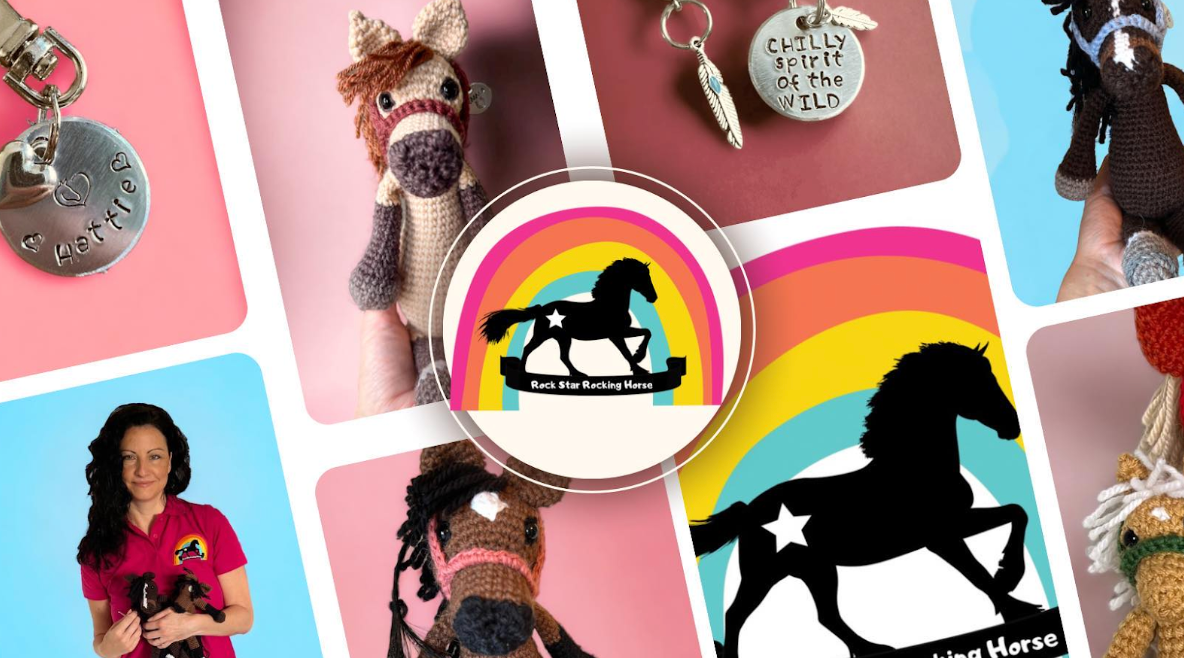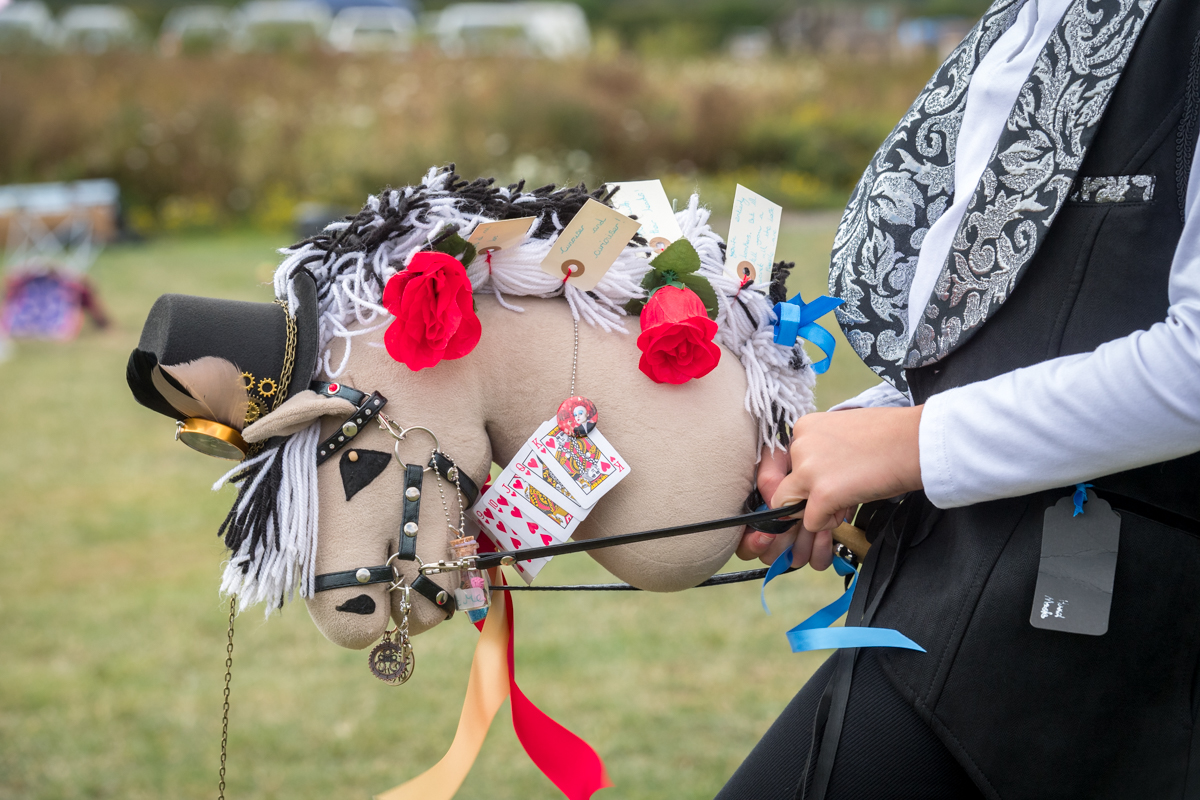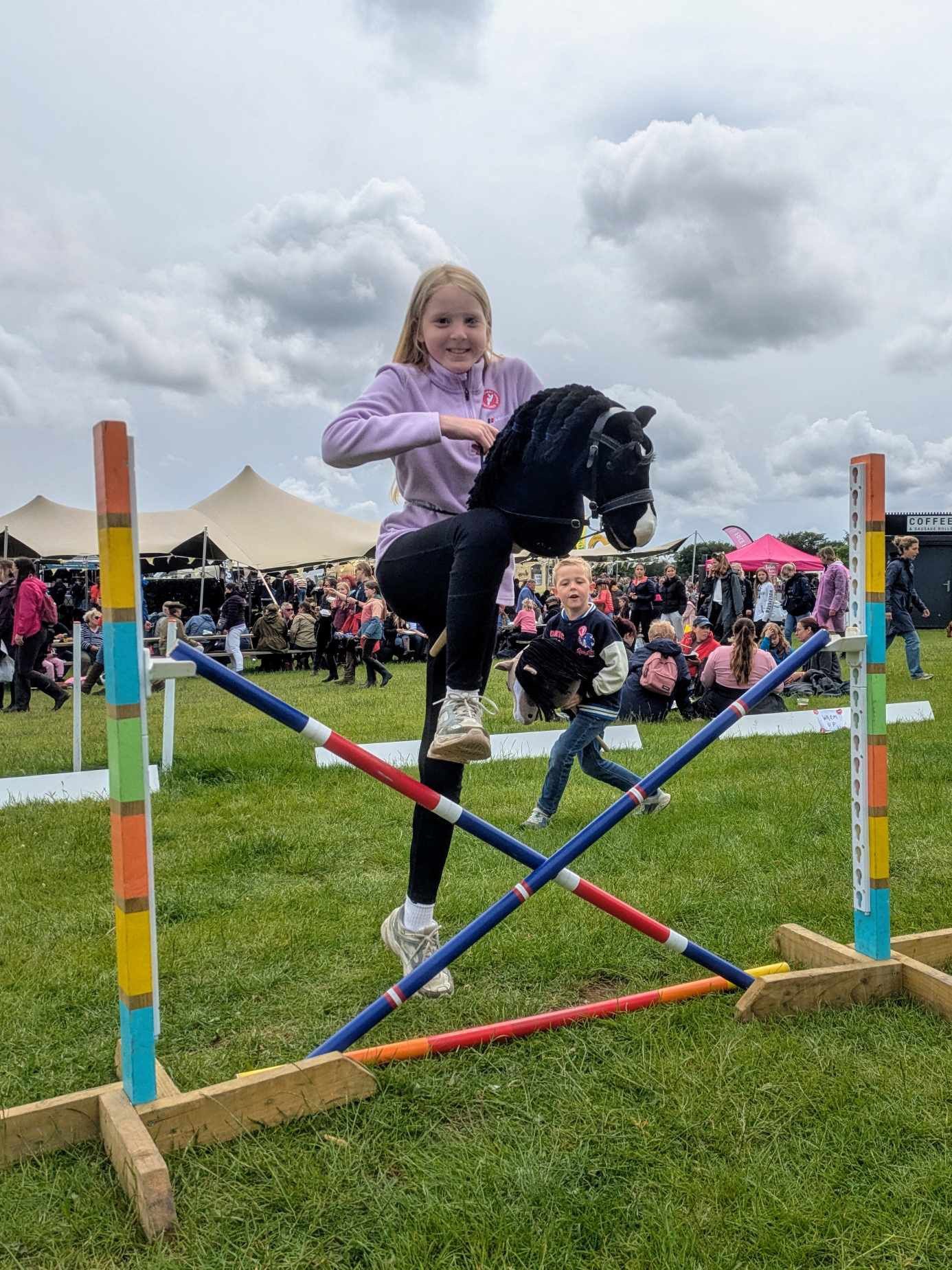
Rock Star Rocking Horse: Spotlight on Our Newest Sponsor
We are thrilled to share that Rock Star Rocking Horse has joined us as our latest sponsor. At Hobby Horse
Finding the right activities for neurodiverse children can be a challenging task, but it’s also an opportunity to discover hobbies that bring joy, comfort, and therapeutic benefits. One such activity that has gained popularity is hobby horsing. While many might see it as a simple play activity, it has proven to be much more—especially for neurodiverse children.
Hobby horsing isn’t just about imaginative play; it’s an experience that engages multiple senses and offers emotional comfort. Much like a therapy pet or a favourite teddy, a hobby horse can become a trusted companion, a source of solace, and a bridge to new social connections. It’s an activity that provides not only physical exercise but also emotional and sensory enrichment.
At Hobby Horse Adventures, we’ve seen firsthand how neurodiverse children have embraced hobby horsing. What began as a niche interest has blossomed into a supportive community where children of all backgrounds can find belonging. Whether it’s the tactile feel of the hobby horse’s mane, the rhythm of movement as they ‘ride,’ or the simple pleasure of being part of a group, hobby horsing has much to offer.
This article will explore the various benefits of hobby horsing and other activities that can be particularly rewarding for neurodiverse children. We’ll delve into why these activities work, how they can be integrated into daily routines, and the ways they contribute to a child’s overall well-being. We invite you to discover how such activities can make a difference in your child’s life.
Neurodiversity refers to the range of differences in individual brain function and behavioural traits, which are considered part of normal variation in the human population. This term encompasses a variety of conditions such as autism spectrum disorder (ASD), attention deficit hyperactivity disorder (ADHD), and Asperger’s syndrome, among others.
Children who are neurodiverse often have unique needs that differ from those of their neurotypical peers. These needs can include a heightened sensitivity to sensory stimuli, challenges with social interaction, and a preference for routines. Many neurodiverse children also experience anxiety and stress when faced with unfamiliar situations or environments that overwhelm their senses.
Understanding these needs is crucial in selecting activities that not only engage these children but also support their development. For instance, activities that provide predictable sensory input can help to reduce anxiety and improve focus. Similarly, activities that encourage social interaction in a structured and supportive environment can help neurodiverse children build confidence and develop social skills at their own pace.
Hobby horsing, for example, offers a multi-sensory experience that can be both calming and stimulating. The tactile sensation of holding and riding the hobby horse, combined with the rhythmic movement, provides a comforting routine that many neurodiverse children find soothing. Moreover, participating in hobby horsing events allows children to interact with others in a way that is both fun and non-threatening, helping to foster a sense of community and belonging.
By carefully considering the unique needs of neurodiverse children, we can select activities that not only entertain but also contribute positively to their overall development and well-being.
Hobby horsing may seem like a simple pastime, but for neurodiverse children, it holds therapeutic value that goes beyond play. At its core, hobby horsing is an activity that involves more than just physical movement—it engages the mind, body, and emotions in a way that is both comforting and empowering.
One of the most significant therapeutic benefits of hobby horsing is its ability to provide sensory input in a controlled and predictable manner. For many neurodiverse children, sensory processing can be a challenge, with certain stimuli causing discomfort or distress. Hobby horsing offers a form of sensory stimulation that is both manageable and enjoyable. The tactile feel of the hobby horse, the repetitive motion of ‘riding,’ and the visual appeal of the horse itself all contribute to a calming sensory experience.
Emotionally, hobby horsing can serve as a source of comfort and companionship. Much like a therapy pet, a hobby horse can become a trusted friend for a child. The bond that forms between a child and their hobby horse can help alleviate feelings of loneliness or anxiety. This bond is especially important for children who may struggle with social interactions, as it provides them with a non-judgmental companion that they can rely on.
Hobby horsing also offers a structured activity that can help neurodiverse children develop important skills. The physical aspect of hobby horsing—balancing, coordinating movements, and following a rhythm—contributes to the development of motor skills and body awareness. Additionally, the routine of caring for and riding a hobby horse can help establish a sense of responsibility and self-discipline, which are valuable life skills.
Beyond the individual benefits, hobby horsing can also be a gateway to social interaction. Participating in group events or hobby horse ‘competitions’ provides opportunities for neurodiverse children to connect with others who share similar interests. These interactions are often more accessible for children who might find traditional social settings overwhelming.
At Hobby Horse Adventures, we’ve seen how hobby horsing has transformed the lives of many neurodiverse children. It’s not just an activity—it’s a therapeutic tool that fosters growth, comfort, and connection. Whether through the sensory pleasure it provides, the emotional bond it nurtures, or the skills it develops, hobby horsing offers a unique form of therapy that resonates deeply with neurodiverse children.
Hobby horsing is uniquely suited to meet the sensory and emotional needs of neurodiverse children. The activity engages multiple senses simultaneously, providing a rich and soothing experience that can help children regulate their emotions and sensory input.
The tactile aspect of hobby horsing is one of its most significant sensory benefits. The feel of the hobby horse’s mane, the smoothness of the wooden stick, and the gentle weight of the horse in a child’s hands all contribute to a calming sensory experience. For children who are sensitive to certain textures, the soft and familiar feel of a hobby horse can be especially comforting.
The movement involved in hobby horsing also plays a crucial role in sensory integration. The repetitive, rhythmic action of ‘riding’ a hobby horse provides a predictable pattern of movement that can help children feel grounded and focused. This type of sensory input is particularly beneficial for children who struggle with proprioception (the sense of body position) or vestibular processing (the sense of balance).
Emotionally, hobby horsing offers a sense of companionship and security. For many neurodiverse children, forming relationships with people can be challenging. A hobby horse can serve as a non-threatening, reliable friend that provides comfort without the complexities of human interaction. This bond helps children feel less isolated and more confident, knowing they have a friend they can always rely on.
The combination of sensory and emotional benefits makes hobby horsing an ideal activity for neurodiverse children. It offers a safe and enjoyable way to engage with the world around them while providing the comfort and stability they need to thrive.
While hobby horsing offers significant sensory and emotional benefits, it also excels as a social and physical activity. For neurodiverse children, engaging in social activities can often be daunting, but hobby horsing provides a supportive and inclusive environment where they can connect with others and enjoy physical exercise.
Physically, hobby horsing promotes coordination, balance, and motor skills. The act of ‘riding’ a hobby horse involves coordinated movements that help children develop their gross motor skills. Balancing on the stick, guiding the horse through various motions, and even participating in mock ‘races’ or obstacle courses all contribute to physical development. This form of exercise is not only fun but also beneficial for overall health and fitness.
Socially, hobby horsing offers a unique way for neurodiverse children to interact with their peers. Unlike traditional sports or group activities that might feel overwhelming, hobby horsing events are often more relaxed and accepting. Children are encouraged to participate at their own pace, without the pressure of competition or the fear of not fitting in. This inclusive atmosphere allows neurodiverse children to feel more comfortable and confident in social settings.
Hobby horsing events, such as those hosted by Hobby Horse Adventures, provide opportunities for children to connect with others who share their interest. These events often include group activities, games, and even friendly competitions, all designed to foster a sense of community and belonging. The shared experience of hobby horsing helps break down social barriers, allowing neurodiverse children to form friendships and enjoy the camaraderie of being part of a group.
Moreover, the structure of hobby horsing events often includes clear rules and routines, which can be reassuring for neurodiverse children who thrive on predictability. Knowing what to expect helps reduce anxiety and allows them to focus on enjoying the activity and engaging with others.
At its core, hobby horsing is an activity that brings people together. It encourages children to be active, to connect with their peers, and to experience the joy of being part of a community. For neurodiverse children, this combination of physical exercise and social interaction in a supportive environment can make a world of difference.
One of the most rewarding aspects of running Hobby Horse Adventures has been witnessing the way our events have evolved into a safe haven for neurodiverse children. What initially began as a fun activity for children interested in hobby horsing has blossomed into a vibrant, inclusive community where every child feels welcome and accepted.
Parents often approach us with concerns about how their neurodiverse child will manage at one of our events. They express worries about sensory overload, social anxiety, or the fear that their child might not fit in. We take these concerns to heart and have dedicated ourselves to creating an environment that is as inclusive and supportive as possible. Every detail of our events is carefully considered to ensure that all children, regardless of their needs, can participate fully and comfortably.
To further support this mission, we created the “Hobby Horse Adventures with Diversity” Facebook group. This online community serves as a space for parents to connect, share experiences, and exchange advice. It also allows us to gather feedback and continuously improve the accessibility of our events. The group has become a vital resource, fostering a sense of belonging even before families attend their first event.
On the day of the event, our team of volunteers plays a crucial role. We have adult volunteers who are specifically trained to assist children and families throughout the day, ensuring that any concerns or needs are promptly addressed. Additionally, we have child volunteers who have often experienced their own challenges with attending events. These young volunteers are exceptional ambassadors of our ethos; they offer guidance, friendship, and a familiar face to children who might be feeling apprehensive.
One of the most heartwarming outcomes we’ve observed is how quickly children who might have been anxious or nervous begin to relax and enjoy themselves. The atmosphere at our events is one of mutual respect and kindness, with all children, neurodiverse or neurotypical, encouraging and supporting one another. The bonds that form during these events are genuine and lasting, often extending beyond the confines of the hobby horse arena.
We’ve also implemented small but meaningful practices to ensure that every child feels valued. For instance, every participant receives a rosette at the end of the event—there’s no competition, only recognition of their effort and participation. This simple gesture has been incredibly well-received, reinforcing our commitment to creating a fun, engaging, and non-judgmental environment.
At Hobby Horse Adventures, we didn’t anticipate the profound impact our events would have on neurodiverse children and their families. But seeing these children thrive, make friends, and feel part of a community has become the most rewarding part of what we do. It’s a privilege to watch them lead the way in making our events a place where everyone fits in.
While hobby horsing offers a wealth of benefits, it’s important to consider a variety of activities that can also be highly therapeutic for neurodiverse children. Each child is unique, and exploring different activities allows parents to find the ones that resonate most with their child’s specific needs and interests.
Each of these activities, like hobby horsing, offers unique therapeutic benefits that can enhance the well-being of neurodiverse children. By exploring different options, parents can create a well-rounded routine that supports their child’s sensory, emotional, and social development.
For many children, collecting hobby horses becomes a hobby in its own right, offering both joy and therapeutic benefits. At Hobby Horse Adventures, we’ve observed how children develop a deep attachment to their hobby horses, often treating them as treasured companions. This bond can be particularly meaningful for neurodiverse children, who may find comfort and security in their collection.
The process of collecting hobby horses allows children to express their individuality and preferences. Each hobby horse is unique, with different colours, designs, and features, giving children the opportunity to choose those that resonate with them. This act of selection is not only enjoyable but also empowering, as it allows children to make decisions and take pride in their choices.
Collecting hobby horses also offers a sense of structure and routine, which can be comforting for neurodiverse children. They may look forward to adding a new horse to their collection, creating a ritual around choosing and caring for their hobby horses. This routine provides a sense of stability and predictability, which can be especially important for children who thrive on consistency.
Furthermore, displaying and organising their collection can become a soothing activity in itself. Arranging hobby horses on shelves or creating a designated space for them allows children to engage in a calming, repetitive task. This can help reduce anxiety and provide a sense of control over their environment.
At Hobby Horse Adventures, we offer a wide range of hobby horses for sale, each designed with care to cater to different preferences and needs. Whether a child prefers a traditional look or a more whimsical design, there’s a hobby horse to suit every personality. Collecting these cherished companions not only brings joy but also contributes to the emotional well-being of neurodiverse children.
Hobby horsing, along with other therapeutic activities, offers invaluable benefits for neurodiverse children. From providing sensory and emotional comfort to fostering social connections and physical development, these activities are more than just pastimes—they are pathways to growth and well-being.
At Hobby Horse Adventures, we are committed to creating inclusive, supportive environments where every child can thrive. We encourage parents to explore these activities, knowing that they can make a profound difference in their child’s life. By embracing the power of play, creativity, and community, we help build a world where all children feel they belong.
Discover the joy and therapeutic benefits of hobby horsing for your child today—join our inclusive community at Hobby Horse Adventures and explore our wide range of beautifully crafted hobby horses! Get in touch today!
If you’re interested in exploring more about therapeutic activities for neurodiverse children and understanding the benefits they offer, here are some useful resources:

We are thrilled to share that Rock Star Rocking Horse has joined us as our latest sponsor. At Hobby Horse

Hobby Horse Adventures made history this summer with the very first UK Hobby Horse Camp, held at Field House Campsite

Mondays: 28 July, 4 / 11 / 18 August 2025Ages 4–16 | £25–£130 | Diamond Families, ST11 A Small, Safe,